PUB5972 - Trait Theories vs. Behavioral Theories of Leadership
VerifiedAdded on 2023/06/11
|8
|1664
|359
Report
AI Summary
This report provides a comparative analysis of trait and behavioral leadership theories, two prominent frameworks for understanding leadership qualities. Trait theories posit that leaders are born with inherent traits and characteristics, citing figures like Nelson Mandela as examples of individuals who inherited leadership qualities. Conversely, behavioral theories suggest that leadership skills can be developed through learning and experience, using Jack Ma as an example of someone who cultivated leadership abilities over time. The report explores the core tenets of each theory, highlighting their strengths and limitations, and concludes that while trait theories emphasize innate qualities, behavioral theories focus on the adaptability and development of leadership skills through specific behaviors and circumstances. This document is available on Desklib, a platform offering a wide array of study tools and resources for students.

Traits and Behaviors of Early Leadership Theories
Paraphrase This Document
Need a fresh take? Get an instant paraphrase of this document with our AI Paraphraser
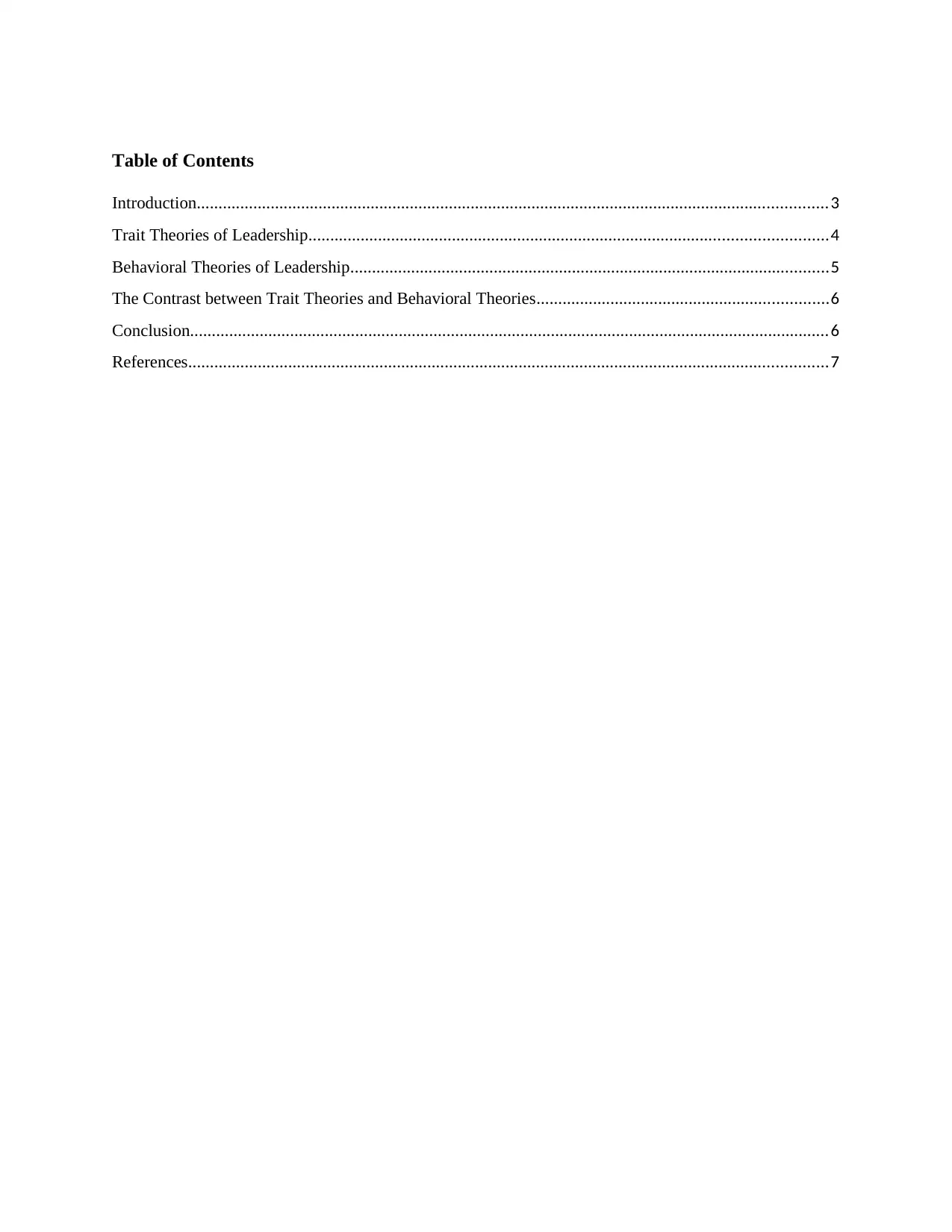
Table of Contents
Introduction.................................................................................................................................................3
Trait Theories of Leadership.......................................................................................................................4
Behavioral Theories of Leadership..............................................................................................................5
The Contrast between Trait Theories and Behavioral Theories...................................................................6
Conclusion...................................................................................................................................................6
References...................................................................................................................................................7
Introduction.................................................................................................................................................3
Trait Theories of Leadership.......................................................................................................................4
Behavioral Theories of Leadership..............................................................................................................5
The Contrast between Trait Theories and Behavioral Theories...................................................................6
Conclusion...................................................................................................................................................6
References...................................................................................................................................................7
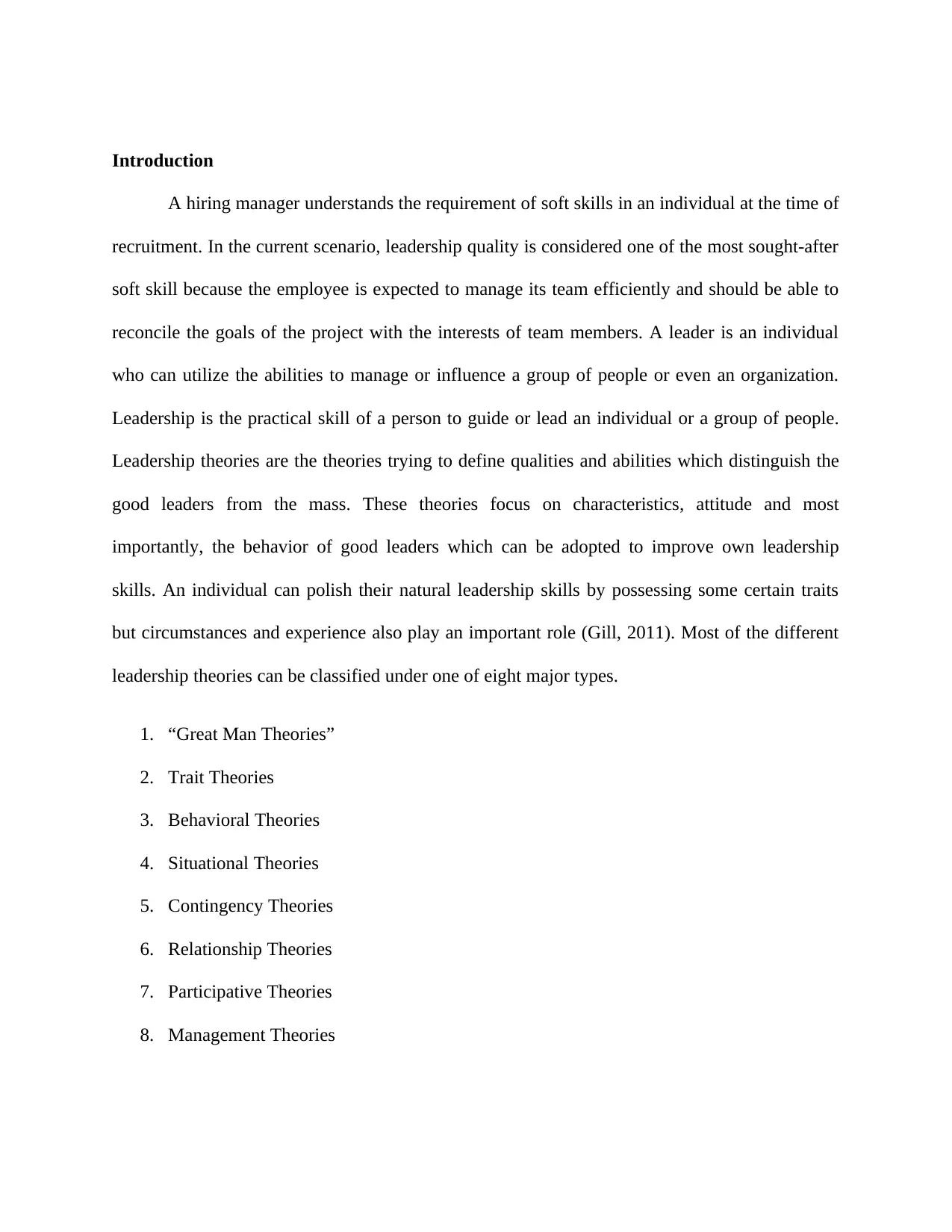
Introduction
A hiring manager understands the requirement of soft skills in an individual at the time of
recruitment. In the current scenario, leadership quality is considered one of the most sought-after
soft skill because the employee is expected to manage its team efficiently and should be able to
reconcile the goals of the project with the interests of team members. A leader is an individual
who can utilize the abilities to manage or influence a group of people or even an organization.
Leadership is the practical skill of a person to guide or lead an individual or a group of people.
Leadership theories are the theories trying to define qualities and abilities which distinguish the
good leaders from the mass. These theories focus on characteristics, attitude and most
importantly, the behavior of good leaders which can be adopted to improve own leadership
skills. An individual can polish their natural leadership skills by possessing some certain traits
but circumstances and experience also play an important role (Gill, 2011). Most of the different
leadership theories can be classified under one of eight major types.
1. “Great Man Theories”
2. Trait Theories
3. Behavioral Theories
4. Situational Theories
5. Contingency Theories
6. Relationship Theories
7. Participative Theories
8. Management Theories
A hiring manager understands the requirement of soft skills in an individual at the time of
recruitment. In the current scenario, leadership quality is considered one of the most sought-after
soft skill because the employee is expected to manage its team efficiently and should be able to
reconcile the goals of the project with the interests of team members. A leader is an individual
who can utilize the abilities to manage or influence a group of people or even an organization.
Leadership is the practical skill of a person to guide or lead an individual or a group of people.
Leadership theories are the theories trying to define qualities and abilities which distinguish the
good leaders from the mass. These theories focus on characteristics, attitude and most
importantly, the behavior of good leaders which can be adopted to improve own leadership
skills. An individual can polish their natural leadership skills by possessing some certain traits
but circumstances and experience also play an important role (Gill, 2011). Most of the different
leadership theories can be classified under one of eight major types.
1. “Great Man Theories”
2. Trait Theories
3. Behavioral Theories
4. Situational Theories
5. Contingency Theories
6. Relationship Theories
7. Participative Theories
8. Management Theories
⊘ This is a preview!⊘
Do you want full access?
Subscribe today to unlock all pages.

Trusted by 1+ million students worldwide
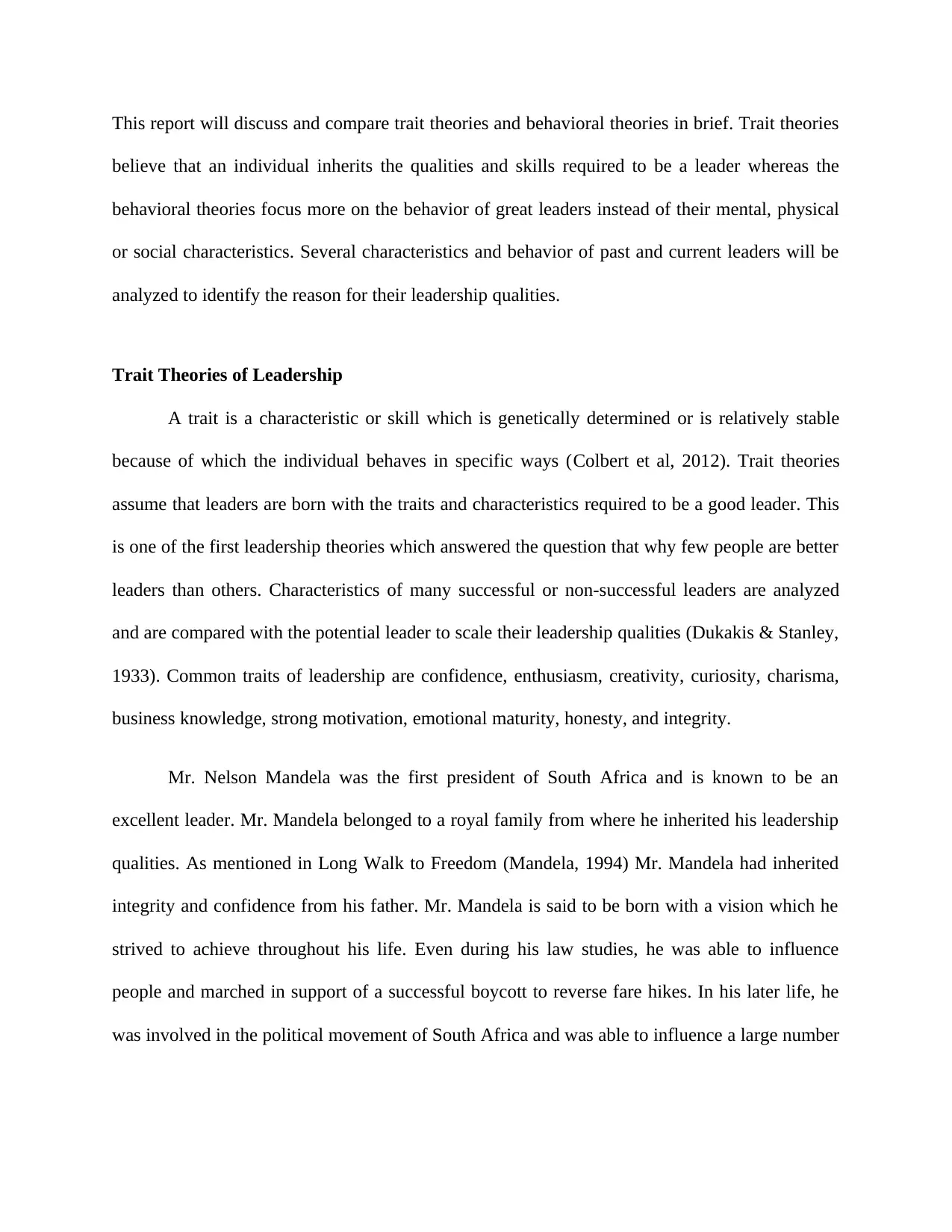
This report will discuss and compare trait theories and behavioral theories in brief. Trait theories
believe that an individual inherits the qualities and skills required to be a leader whereas the
behavioral theories focus more on the behavior of great leaders instead of their mental, physical
or social characteristics. Several characteristics and behavior of past and current leaders will be
analyzed to identify the reason for their leadership qualities.
Trait Theories of Leadership
A trait is a characteristic or skill which is genetically determined or is relatively stable
because of which the individual behaves in specific ways (Colbert et al, 2012). Trait theories
assume that leaders are born with the traits and characteristics required to be a good leader. This
is one of the first leadership theories which answered the question that why few people are better
leaders than others. Characteristics of many successful or non-successful leaders are analyzed
and are compared with the potential leader to scale their leadership qualities (Dukakis & Stanley,
1933). Common traits of leadership are confidence, enthusiasm, creativity, curiosity, charisma,
business knowledge, strong motivation, emotional maturity, honesty, and integrity.
Mr. Nelson Mandela was the first president of South Africa and is known to be an
excellent leader. Mr. Mandela belonged to a royal family from where he inherited his leadership
qualities. As mentioned in Long Walk to Freedom (Mandela, 1994) Mr. Mandela had inherited
integrity and confidence from his father. Mr. Mandela is said to be born with a vision which he
strived to achieve throughout his life. Even during his law studies, he was able to influence
people and marched in support of a successful boycott to reverse fare hikes. In his later life, he
was involved in the political movement of South Africa and was able to influence a large number
believe that an individual inherits the qualities and skills required to be a leader whereas the
behavioral theories focus more on the behavior of great leaders instead of their mental, physical
or social characteristics. Several characteristics and behavior of past and current leaders will be
analyzed to identify the reason for their leadership qualities.
Trait Theories of Leadership
A trait is a characteristic or skill which is genetically determined or is relatively stable
because of which the individual behaves in specific ways (Colbert et al, 2012). Trait theories
assume that leaders are born with the traits and characteristics required to be a good leader. This
is one of the first leadership theories which answered the question that why few people are better
leaders than others. Characteristics of many successful or non-successful leaders are analyzed
and are compared with the potential leader to scale their leadership qualities (Dukakis & Stanley,
1933). Common traits of leadership are confidence, enthusiasm, creativity, curiosity, charisma,
business knowledge, strong motivation, emotional maturity, honesty, and integrity.
Mr. Nelson Mandela was the first president of South Africa and is known to be an
excellent leader. Mr. Mandela belonged to a royal family from where he inherited his leadership
qualities. As mentioned in Long Walk to Freedom (Mandela, 1994) Mr. Mandela had inherited
integrity and confidence from his father. Mr. Mandela is said to be born with a vision which he
strived to achieve throughout his life. Even during his law studies, he was able to influence
people and marched in support of a successful boycott to reverse fare hikes. In his later life, he
was involved in the political movement of South Africa and was able to influence a large number
Paraphrase This Document
Need a fresh take? Get an instant paraphrase of this document with our AI Paraphraser
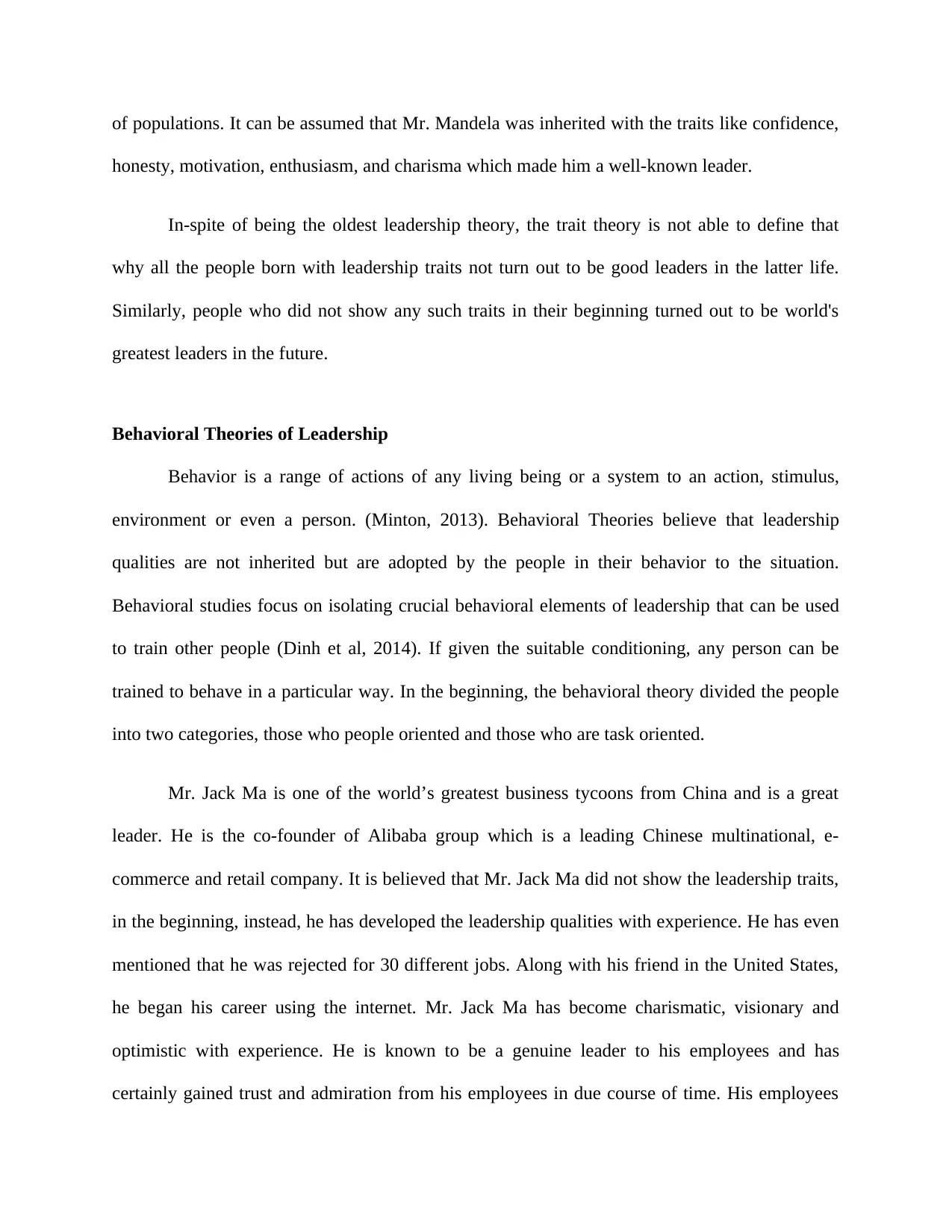
of populations. It can be assumed that Mr. Mandela was inherited with the traits like confidence,
honesty, motivation, enthusiasm, and charisma which made him a well-known leader.
In-spite of being the oldest leadership theory, the trait theory is not able to define that
why all the people born with leadership traits not turn out to be good leaders in the latter life.
Similarly, people who did not show any such traits in their beginning turned out to be world's
greatest leaders in the future.
Behavioral Theories of Leadership
Behavior is a range of actions of any living being or a system to an action, stimulus,
environment or even a person. (Minton, 2013). Behavioral Theories believe that leadership
qualities are not inherited but are adopted by the people in their behavior to the situation.
Behavioral studies focus on isolating crucial behavioral elements of leadership that can be used
to train other people (Dinh et al, 2014). If given the suitable conditioning, any person can be
trained to behave in a particular way. In the beginning, the behavioral theory divided the people
into two categories, those who people oriented and those who are task oriented.
Mr. Jack Ma is one of the world’s greatest business tycoons from China and is a great
leader. He is the co-founder of Alibaba group which is a leading Chinese multinational, e-
commerce and retail company. It is believed that Mr. Jack Ma did not show the leadership traits,
in the beginning, instead, he has developed the leadership qualities with experience. He has even
mentioned that he was rejected for 30 different jobs. Along with his friend in the United States,
he began his career using the internet. Mr. Jack Ma has become charismatic, visionary and
optimistic with experience. He is known to be a genuine leader to his employees and has
certainly gained trust and admiration from his employees in due course of time. His employees
honesty, motivation, enthusiasm, and charisma which made him a well-known leader.
In-spite of being the oldest leadership theory, the trait theory is not able to define that
why all the people born with leadership traits not turn out to be good leaders in the latter life.
Similarly, people who did not show any such traits in their beginning turned out to be world's
greatest leaders in the future.
Behavioral Theories of Leadership
Behavior is a range of actions of any living being or a system to an action, stimulus,
environment or even a person. (Minton, 2013). Behavioral Theories believe that leadership
qualities are not inherited but are adopted by the people in their behavior to the situation.
Behavioral studies focus on isolating crucial behavioral elements of leadership that can be used
to train other people (Dinh et al, 2014). If given the suitable conditioning, any person can be
trained to behave in a particular way. In the beginning, the behavioral theory divided the people
into two categories, those who people oriented and those who are task oriented.
Mr. Jack Ma is one of the world’s greatest business tycoons from China and is a great
leader. He is the co-founder of Alibaba group which is a leading Chinese multinational, e-
commerce and retail company. It is believed that Mr. Jack Ma did not show the leadership traits,
in the beginning, instead, he has developed the leadership qualities with experience. He has even
mentioned that he was rejected for 30 different jobs. Along with his friend in the United States,
he began his career using the internet. Mr. Jack Ma has become charismatic, visionary and
optimistic with experience. He is known to be a genuine leader to his employees and has
certainly gained trust and admiration from his employees in due course of time. His employees
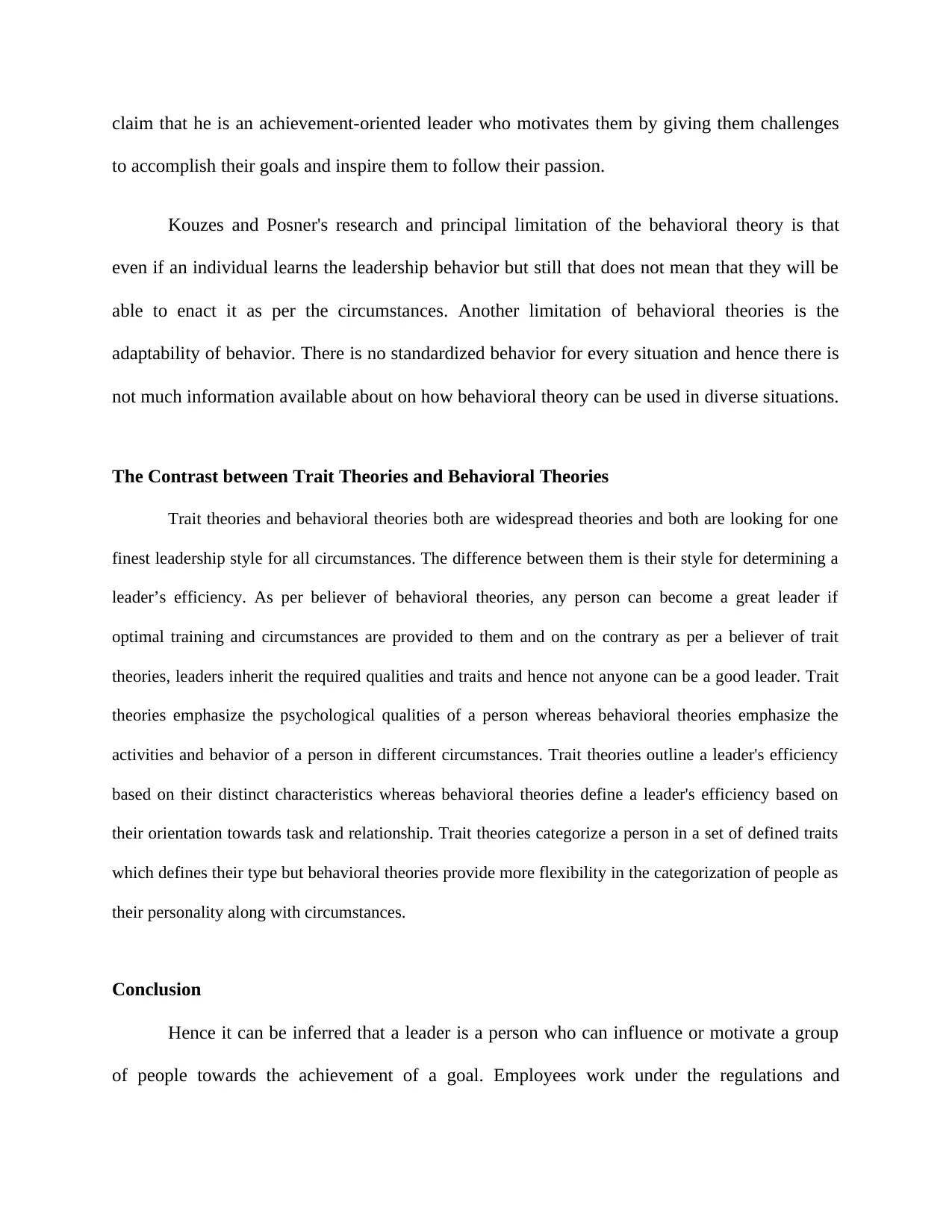
claim that he is an achievement-oriented leader who motivates them by giving them challenges
to accomplish their goals and inspire them to follow their passion.
Kouzes and Posner's research and principal limitation of the behavioral theory is that
even if an individual learns the leadership behavior but still that does not mean that they will be
able to enact it as per the circumstances. Another limitation of behavioral theories is the
adaptability of behavior. There is no standardized behavior for every situation and hence there is
not much information available about on how behavioral theory can be used in diverse situations.
The Contrast between Trait Theories and Behavioral Theories
Trait theories and behavioral theories both are widespread theories and both are looking for one
finest leadership style for all circumstances. The difference between them is their style for determining a
leader’s efficiency. As per believer of behavioral theories, any person can become a great leader if
optimal training and circumstances are provided to them and on the contrary as per a believer of trait
theories, leaders inherit the required qualities and traits and hence not anyone can be a good leader. Trait
theories emphasize the psychological qualities of a person whereas behavioral theories emphasize the
activities and behavior of a person in different circumstances. Trait theories outline a leader's efficiency
based on their distinct characteristics whereas behavioral theories define a leader's efficiency based on
their orientation towards task and relationship. Trait theories categorize a person in a set of defined traits
which defines their type but behavioral theories provide more flexibility in the categorization of people as
their personality along with circumstances.
Conclusion
Hence it can be inferred that a leader is a person who can influence or motivate a group
of people towards the achievement of a goal. Employees work under the regulations and
to accomplish their goals and inspire them to follow their passion.
Kouzes and Posner's research and principal limitation of the behavioral theory is that
even if an individual learns the leadership behavior but still that does not mean that they will be
able to enact it as per the circumstances. Another limitation of behavioral theories is the
adaptability of behavior. There is no standardized behavior for every situation and hence there is
not much information available about on how behavioral theory can be used in diverse situations.
The Contrast between Trait Theories and Behavioral Theories
Trait theories and behavioral theories both are widespread theories and both are looking for one
finest leadership style for all circumstances. The difference between them is their style for determining a
leader’s efficiency. As per believer of behavioral theories, any person can become a great leader if
optimal training and circumstances are provided to them and on the contrary as per a believer of trait
theories, leaders inherit the required qualities and traits and hence not anyone can be a good leader. Trait
theories emphasize the psychological qualities of a person whereas behavioral theories emphasize the
activities and behavior of a person in different circumstances. Trait theories outline a leader's efficiency
based on their distinct characteristics whereas behavioral theories define a leader's efficiency based on
their orientation towards task and relationship. Trait theories categorize a person in a set of defined traits
which defines their type but behavioral theories provide more flexibility in the categorization of people as
their personality along with circumstances.
Conclusion
Hence it can be inferred that a leader is a person who can influence or motivate a group
of people towards the achievement of a goal. Employees work under the regulations and
⊘ This is a preview!⊘
Do you want full access?
Subscribe today to unlock all pages.

Trusted by 1+ million students worldwide
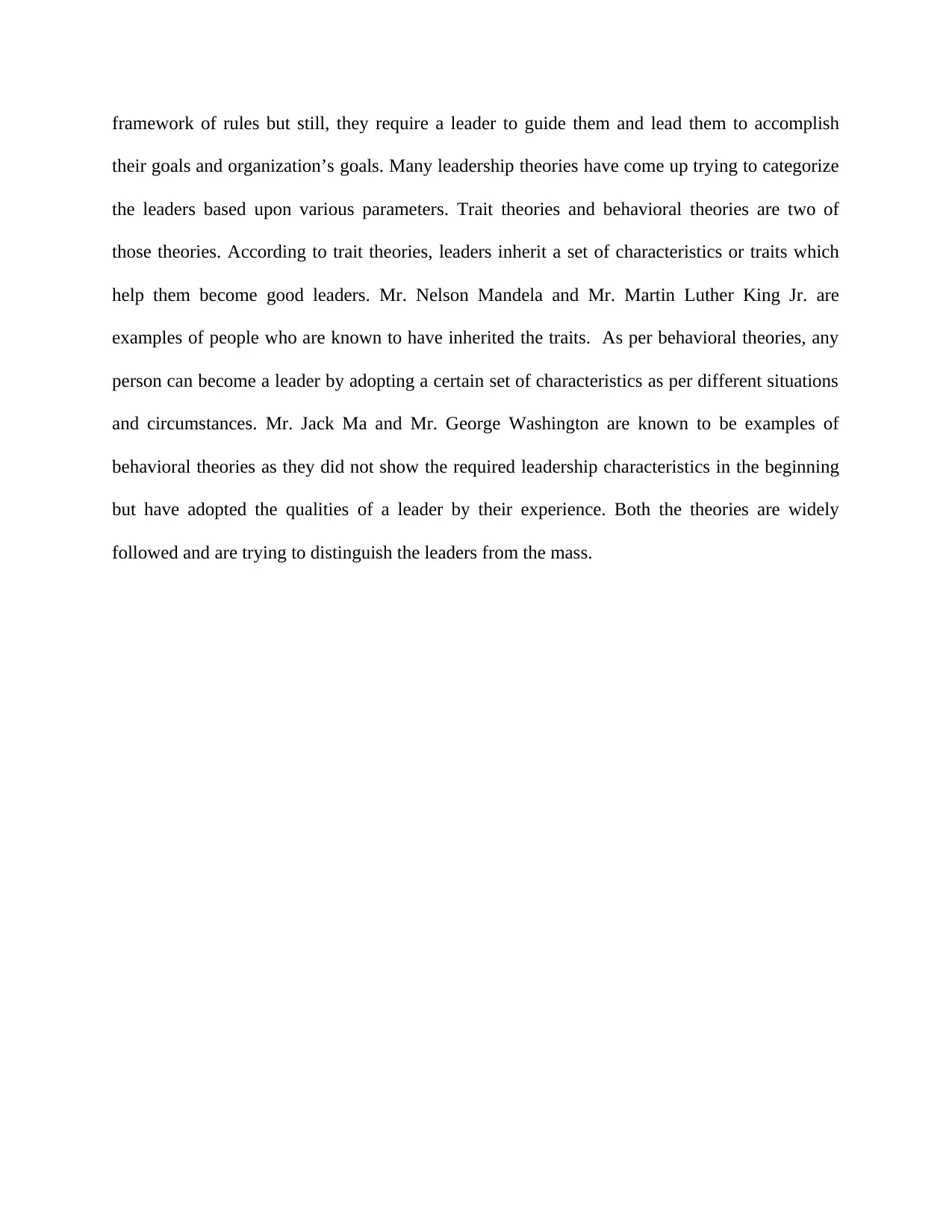
framework of rules but still, they require a leader to guide them and lead them to accomplish
their goals and organization’s goals. Many leadership theories have come up trying to categorize
the leaders based upon various parameters. Trait theories and behavioral theories are two of
those theories. According to trait theories, leaders inherit a set of characteristics or traits which
help them become good leaders. Mr. Nelson Mandela and Mr. Martin Luther King Jr. are
examples of people who are known to have inherited the traits. As per behavioral theories, any
person can become a leader by adopting a certain set of characteristics as per different situations
and circumstances. Mr. Jack Ma and Mr. George Washington are known to be examples of
behavioral theories as they did not show the required leadership characteristics in the beginning
but have adopted the qualities of a leader by their experience. Both the theories are widely
followed and are trying to distinguish the leaders from the mass.
their goals and organization’s goals. Many leadership theories have come up trying to categorize
the leaders based upon various parameters. Trait theories and behavioral theories are two of
those theories. According to trait theories, leaders inherit a set of characteristics or traits which
help them become good leaders. Mr. Nelson Mandela and Mr. Martin Luther King Jr. are
examples of people who are known to have inherited the traits. As per behavioral theories, any
person can become a leader by adopting a certain set of characteristics as per different situations
and circumstances. Mr. Jack Ma and Mr. George Washington are known to be examples of
behavioral theories as they did not show the required leadership characteristics in the beginning
but have adopted the qualities of a leader by their experience. Both the theories are widely
followed and are trying to distinguish the leaders from the mass.
Paraphrase This Document
Need a fresh take? Get an instant paraphrase of this document with our AI Paraphraser
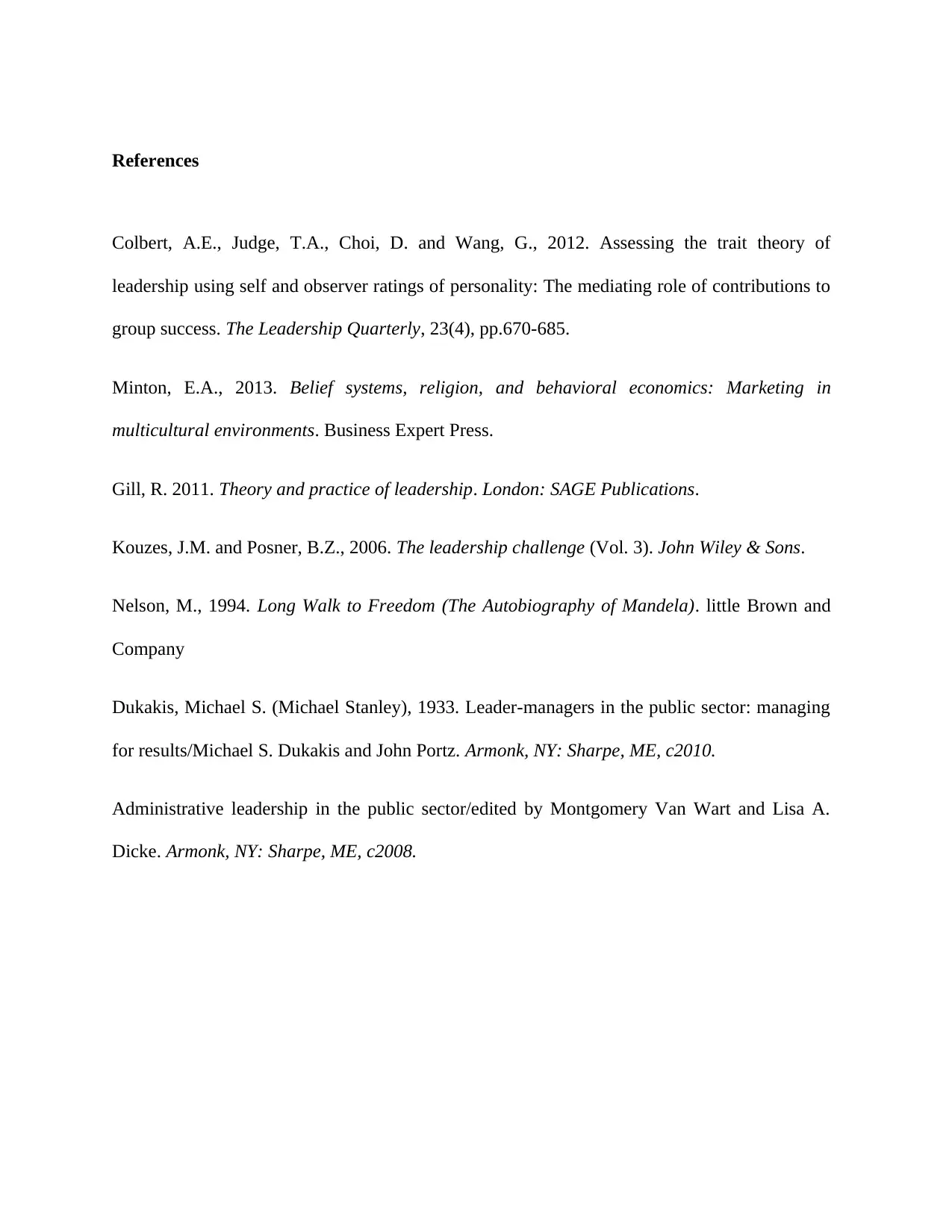
References
Colbert, A.E., Judge, T.A., Choi, D. and Wang, G., 2012. Assessing the trait theory of
leadership using self and observer ratings of personality: The mediating role of contributions to
group success. The Leadership Quarterly, 23(4), pp.670-685.
Minton, E.A., 2013. Belief systems, religion, and behavioral economics: Marketing in
multicultural environments. Business Expert Press.
Gill, R. 2011. Theory and practice of leadership. London: SAGE Publications.
Kouzes, J.M. and Posner, B.Z., 2006. The leadership challenge (Vol. 3). John Wiley & Sons.
Nelson, M., 1994. Long Walk to Freedom (The Autobiography of Mandela). little Brown and
Company
Dukakis, Michael S. (Michael Stanley), 1933. Leader-managers in the public sector: managing
for results/Michael S. Dukakis and John Portz. Armonk, NY: Sharpe, ME, c2010.
Administrative leadership in the public sector/edited by Montgomery Van Wart and Lisa A.
Dicke. Armonk, NY: Sharpe, ME, c2008.
Colbert, A.E., Judge, T.A., Choi, D. and Wang, G., 2012. Assessing the trait theory of
leadership using self and observer ratings of personality: The mediating role of contributions to
group success. The Leadership Quarterly, 23(4), pp.670-685.
Minton, E.A., 2013. Belief systems, religion, and behavioral economics: Marketing in
multicultural environments. Business Expert Press.
Gill, R. 2011. Theory and practice of leadership. London: SAGE Publications.
Kouzes, J.M. and Posner, B.Z., 2006. The leadership challenge (Vol. 3). John Wiley & Sons.
Nelson, M., 1994. Long Walk to Freedom (The Autobiography of Mandela). little Brown and
Company
Dukakis, Michael S. (Michael Stanley), 1933. Leader-managers in the public sector: managing
for results/Michael S. Dukakis and John Portz. Armonk, NY: Sharpe, ME, c2010.
Administrative leadership in the public sector/edited by Montgomery Van Wart and Lisa A.
Dicke. Armonk, NY: Sharpe, ME, c2008.
1 out of 8
Related Documents
Your All-in-One AI-Powered Toolkit for Academic Success.
+13062052269
info@desklib.com
Available 24*7 on WhatsApp / Email
![[object Object]](/_next/static/media/star-bottom.7253800d.svg)
Unlock your academic potential
Copyright © 2020–2026 A2Z Services. All Rights Reserved. Developed and managed by ZUCOL.




